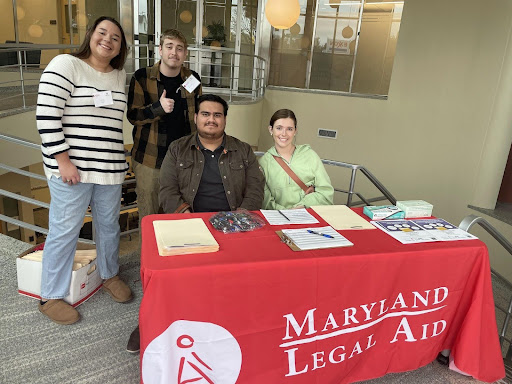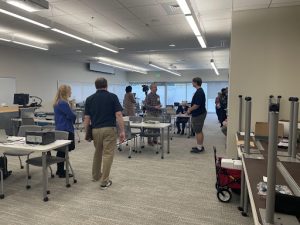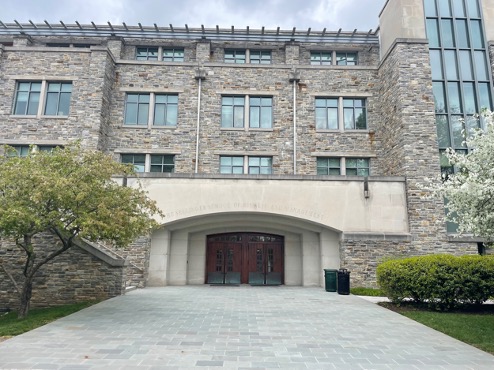
Loyola University Maryland held their annual Expungement Clinic at the Loyola Clinical Center in Belvedere Square. On Oct. 29, the Expungement Clinic hosted 42 clients, and they created petitions for expungement for 27 of these clients, some of whom had multiple records. Attorneys from Maryland Legal Aid and students welcomed walk-ins and helped direct them to begin the process.
Student volunteers and people from Maryland Legal Aid greet the clients at the door.
Maryland Legal Aid provided petitions for criminal records to be cleared by the court. The attorneys checked to make sure the records were eligible to be expunged. Once done filling out forms, the students accompanied the clients to meet an attorney. The room had multiple tables with a laptop and chairs so they could discuss the record and what can be done. Dr. Matt Beverlin, the advisor for the program, shared important details on the clinic and expungeable records.
“DUI’s can’t be expunged, but the things that can be are assault and weapons related as well as much lesser. This is Loyola’s first clinic held since a marijuana charge can be expunged. One thing about the records is it’s not necessarily that they were found guilty. They could have taken a plea or could have had contact with the police,” said Beverlin.
Dr. Beverlin is an attorney who has worked in the past as a legislative policy analyst and federal law clerk. By partnering with Maryland Legal Aid, Loyola can get attorneys that want to help. These attorneys are volunteering to do this work, also known as pro bono work. He even talks about some of the records that they would be able to expunge, but also the ones that cannot.

The room where people are brought to talk further about getting the record expunged.
“At this clinic, it has to be Maryland, the record would have to have come from Maryland. There is a statute that requires someone to take action required, you have to petition for the expungement to go through,” said Beverlin.
Dr. Beverlin and the attorneys from Maryland Legal Aid went on computers to see what they can do for the clients. When on the computer they were able to see if the record is something they would be able to possibly expunge.
Unfortunately, there are some charges that can’t be expunged such as minor traffic charges, civil cases involving child support, judgements, peace orders and protective orders. Not only are there attorneys there to help, but also student volunteers who are interested in pursuing careers or volunteer positions in law, like Liz Kosik ‘25, president of Loyola’s Pre-Law Program.

“It’s definitely a big leadership development…It kind of forces you to get out of your box to talk to people who know no more than you like that. I don’t know what it is yet. I’m getting there, but like they all know more than you I think that it lets you develop into a person that has a lot of humility to make mistakes,” said Kosik.
Talking with the attorneys and working with them was an experience Kosik said she was looking forward to having. She always had an interest in law, and within that, she knew she wanted to be a part of Loyola’s Pre-Law program. Being part of the program includes engagement in activities such as the Expungement Clinic. Kosik said she gained understanding from talking to lawyers about the people in the community, and learned more about the law in the process.
The Expungement Clinic is the fourth of its kind, and another one is happening in the spring. Both Loyola and attorneys from Maryland Legal Aid want to continue this tradition to help the people in their community.
The process to get a record expunged takes about three months. It’s up to the State’s Attorney office if they would want to object to the petition for any reason within the first month. If there is no objection, then for the next two months whichever agency involved has two months to abide by the court and expunge the record. By getting their records expunged, these people have another chance and can do the things that the record had restricted them from doing.
“The engagement of humanity and compassion. Oftentimes people come in and they have these records they are completely embarrassed and are super vulnerable. They’re talking about a mistake that they made years ago, with somebody who doesn’t know them, so just to see that mutual exchange of empathy and to just take it with you and implement it into your perspective [is so important],” said Kosik.








































































































